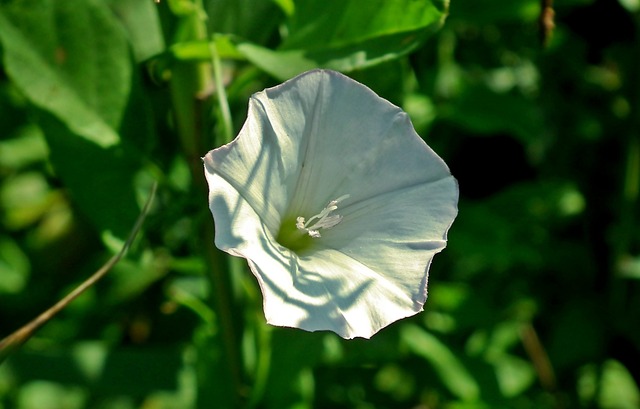
Bindweed is a type of plant that contains poisonous alkaloids. This means it's a real problem for other plants because it's capable of outgrowing them and taking all the sunlight, nutrients, and water for itself. But is it a threat to humans or animals? Today we're going to learn all about bindweed and answer the question - is bindweed poisonous?
Where does bindweed grow
Here at Total Weed Control, we often hear about bindweed being mistaken for Japanese knotweed, and that's because it grows in a lot of the same places that Japanese knotweed does. You will often find an abundance of bindweed around roadsides, near railways, and on grassy banks. It grows throughout England, Wales, and Ireland but is less commonly found in Scotland.
Like Japanese knotweed, bindweed is hard to eradicate completely because it has a strong, perennial root system. The smallest fragments of bindweed root in the soil can cause the plant to regenerate during the next season, so it really is important that removal efforts are thorough if you're trying to eradicate bindweed.
What does bindweed look like?
With strong stems that climb walls and large, white trumpet flowers, bindweed is quite easy to distinguish from other plants. It has a tendency to smother other hedges, shrubs, and surrounding greenery, so you'll often find it intertwined with other plants. It's most commonly found in hedgerows, so if your garden contains a lot of shrubs, make sure you're on the lookout.
The most defining feature of bindweed is the large, white flowers that look a bit like a trumpet. Yes, they might be pretty, but as we are about to discover, you shouldn't be fooled by the pretty white flowers - bindweed can be dangerous!
Is bindweed poisonous to humans?
White bindweed contains a lot of alkaloids, it isn't necessarily poisonous to humans. The main reason why bindweed would be a problem for humans is that it's capable of outcompeting most other plants. If it finds its way into your vegetable garden, it's likely that most of your hard work will go to waste! None of your carrots, broccoli, beans, or peas will be able to compete against this troublesome weed.
That being said, we wouldn't recommend that you go out and start consuming bindweed. Its stem contains a milky substance, and if you consume too much of this, it can have a laxative effect. Some cultures use bindweed as a herbal medicine to treat urinary tract problems, and constipation and to increase bile production. The people who use bindweed for these purposes have perfected the dose and know how to use it in a safe manner, so please don't attempt to use this as an ad-hoc remedy for yourself!
Is bindweed poisonous to animals?
While bindweed is not so much of a problem for humans, it can be incredibly dangerous for animals. When animals, such as horses, eat bindweed it can cause disruption to their digestive and nervous systems. This can lead to progressive weight loss and colic. In severe cases, where an animal has eaten a large amount of bindweed, it can be fatal. That's why it's important you remove bindweed from your garden or the surrounding areas if you have pets.
Here at Total Weed Control, we offer a wide range of weed removal services and will be able to help you identify and tackle bindweed quickly. We also specialise in dealing with Japanese knotweed, which is another troublesome weed in the invasive species family!
Weed Removal Services >
